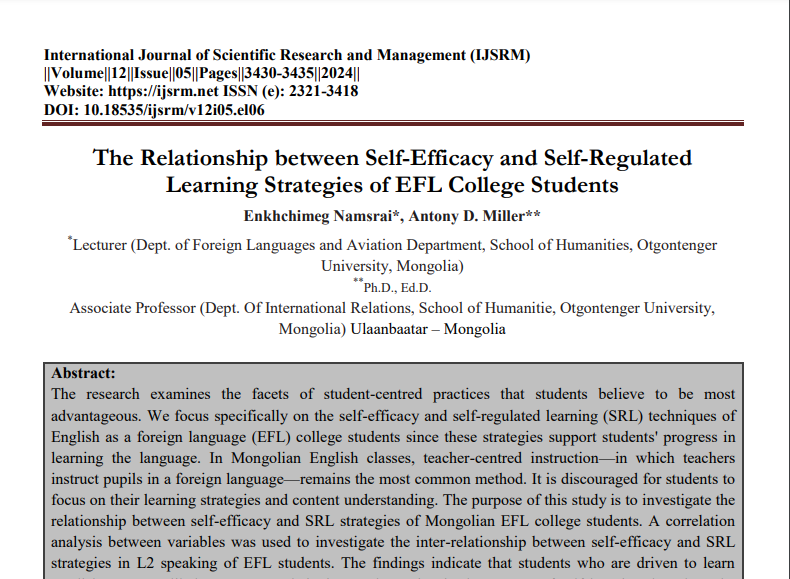The Relationship between Self-Efficacy and Self-Regulated Learning Strategies of EFL College Students

Submission to VIJ 2024-05-28
Keywords
- self-efficacy, self-regulation, learning strategies, EFL, college students
Copyright (c) 2024 Antony D. Miller, Enkhchimeg Namsrai

This work is licensed under a Creative Commons Attribution 4.0 International License.
Abstract
The research examines the facets of student-centred practices that students believe to be most advantageous. We focus specifically on the self-efficacy and self-regulated learning (SRL) techniques of English as a foreign language (EFL) college students since these strategies support students' progress in learning the language. In Mongolian English classes, teacher-centred instruction—in which teachers instruct pupils in a foreign language—remains the most common method. It is discouraged for students to focus on their learning strategies and content understanding. The purpose of this study is to investigate the relationship between self-efficacy and SRL strategies of Mongolian EFL college students. A correlation analysis between variables was used to investigate the inter-relationship between self-efficacy and SRL strategies in L2 speaking of EFL students. The findings indicate that students who are driven to learn English are more likely to manage their time and exertion in the process of self-learning, based on the major findings of this study. Because the results clearly show that English instruction at Mongolia's higher education level has improved, the findings are especially noteworthy.
References
- Alotumi, M. (2021). EFL college junior and senior students’ self-regulated motivation for improving English speaking: A survey study. Heliyon, 7(4), e06664.
- Bandura, A. (1993). Perceived self-efficacy in cognitive development and functioning. Educational Psychologist, 28(2), 117-148.
- Bandura, A. (1997). Self-efficacy: The exercise of control. W H Freeman/Times Books/ Henry Holt & Co.
- Bong, M., & Clark, R. E. (1999). Comparison between self-concept and self-efficacy in academic motivation research. Educational Psychologist, 34(3), 139-153.
- Carver, C. S., & Scheier, M. F. (1981). Attention and self-regulation: A control theory approach to human behavior. New York: Springer.
- Cho, Y. A., Kim, Y, (2019). The relationship between self-efficacy beliefs and self-regulated learning strategies in Korean EFL learners. LAK Journal, 27(3), 53-74.
- Kim, K. J. (2012). Language learning belief factors affecting English achievement. English Teaching, 67(4), 173-194.
- Lee, D., Allen, M., Cheng, L., Watson, S., & Watson, W. (2021). Exploring relationships between self-efficacy and self-regulated learning strategies of English language learners in a college setting. Journal of International Students, 11(3), 567-585.
- Lindsay, C., & Knight, P. (2006). Learning and teaching English: A course for teachers. Oxford University Press.
- Mills, N. (2014). Self-efficacy in second language acquisition. In S. Mercer & M. Williams (Eds.), Multiple perspectives on the self in SLA (pp. 6-22). New York: Multilingual Matters.
- Onoda, S. (2014). Examining the relationships between self-efficacy, effort regulation strategy use, and English vocabulary skills. Studies in Self-Access Learning Journal, 5(4), 357-371.
- Pajares, F. M. (2008). Motivational role of self-efficacy beliefs in self-regulated learning. New York: Routledge.
- Pintrich, P. R. (1999). The role of motivation in promoting and sustaining self-regulated learning. International Journal of Educational Research, 31(6), 459-470.
- Putra, I. D. G. R. D., Saukah, A., Basthomi, Y., & Irawati, E. (2020). The predicting power of self-efficacy on students’ argumentative writing quality. Journal of Asia TEFL, 17(2), 379-394.
- Sun, T., & Wang, C. (2020). College students’ writing self-efficacy and writing self-regulated learning strategies in learning English as a foreign language. System, 90, 102221.
- Thornbury, S. (2005). How to teach speaking. U.K.: Pearson.
- Wang, C., & Bai, B. (2017). Validating the instruments to measure ESL/EFL learners’ self-efficacy beliefs and self-regulated learning strategies. TESOL Quarterly, 51, 931-947.